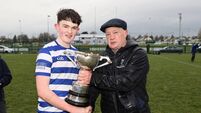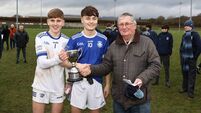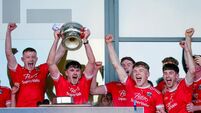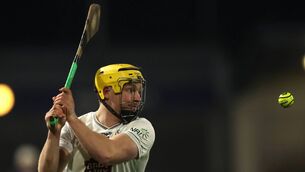A good start but it's only the beginning...
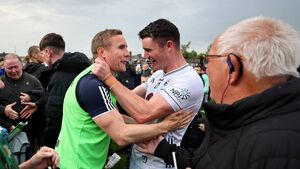
Brian Flanagan and Alex Beirne celebrate a Leinster Championship win over Westeam in Cedral St Conleths Park. A 100 per cent home this year gives Kildare a great platform going into 2026 Photo: ©INPHO/Bryan Keane
This time last year, Brian, the news came through that your name was to be sent forward for ratification as the new Kildare senior football manager at the September county meeting, how do you reflect on that particular time?
Delighted first of all to get the job, Pat, and then once I had it my thoughts very quickly turned to the players I wanted to work with, the backroom team that I had on board and the last few bits and pieces I needed to add. We immediately turned our attention to the Club Championship with an even clearer focus as to what we wanted from it. I really enjoyed that, I have to say, that starting process where there was no real pressure on you. There was no expectancy around results or games or anything like that, it's was just enjoying all three Club Championships for what they were, judging lads against each other and going away with your thoughts after each game.
So, the first part was to get 50/60 fellas that we thought were close to the calibre or standard of footballer we needed. We got them in then to start our pre-season, start our testing and get them on S&C programmes. We played a couple of challenge games and we quickly whittled that number down to what we needed. I got a real sense early doors that there was an energy and a want and a drive from every player that we spoke to and they wanted to bring it to a better place. That was very encouraging.
You have a big management team/background team but everybody seems to have a focus, everybody seems to have a role.
Before I put the names to it, I was very clear in my own head back in May, June, July as to what the roles would be and then it was a case of going after best in class in each of those roles. I wanted a Lead Coach, I wanted an Assistant Coach and I wanted a selector. I felt S&C was going to be a massive focus for Kildare football and for this group over the next couple of years. We have three exceptional S&C coaches, all of whom are lead intercounty S&C coaches in their own right. This year I thought one of the biggest feedback points from players when the year ended was how good they felt about the team that operated with them. Obviously, you have all the other elements of a background team at inter county level - the logistics, the nutrition, the goalkeeping coach, the analysis team. There were certain elements that we built as the year went on but, in general, the background team clicked very, very well. There was a lovely dynamic and I think that dynamic fed off on the players every time we came together.
The three men you involved at management level were all men you trusted?
Exactly, yeah. It was very important for me, that I knew the personalities, I knew the abilities, and I knew the character of them. With Aiden O'Rourke was one of the best coaches I ever played under so I was very keen to have Aiden on board. Damien Hendy, I think it goes without question as to what he has done at club level in Kildare, at underage and the type of player that he was, his own personal standards when he played and his approach to football. He's just a deep thinker about the game so I was delighted to get Damien on board. And then Daryl (Flynn) was someone that I had played with, soldiered with and for the characteristic I was looking to put into this team and that bit of steel I was looking to put around the middle I felt Daryl’s playing career and the type of man he is was going to be very impactful on some of these younger lads. I was really, really happy with the immediate coaching and a background team I had around me.
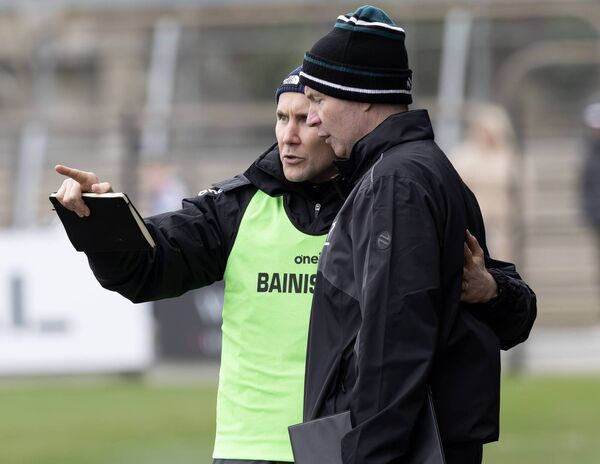
When you started to think about a squad did you have a particular type of player in mind, a particular system because there is probably a ten year gap between the youngest and the oldest player so the age profile is quite wide?
It is and I suppose initially we set out that if we finished the year and we could describe our squad as young, athletic and with loads of scope for improvement, that was what we wanted. That's not to say that we didn't see the merit or the importance of having seniority and experienced heads around the place, we absolutely did. I spoke with those lads early doors and made sure they were on board. The Mick O’Gradys, Kevin Feelys, Daniel Flynns, Niall Kellys, David Highlands, Brian Byrnes and once we had them locked in we were confident enough that we would have the leadership, we would have the composure and experience that they would bring. That allowed us then to go after a young panel, go after a very athletic, dynamic squad that could improve, could build, could get bigger, stronger, quicker over the coming years and we do feel that we've achieved that at the end of year one.
How did you go about selecting your captain, was that an easy task?
I think if you look at the performance last year of Kildare team and players, Kevin Feeley was the name that almost at the end of every game people were talking about. Even though the result didn't go our way Kevin did the business. Kevin did as much as he could possibly do to turn the result into Kildare’s favour. I think he is someone that has always led by example, on and off the field, for the past decade and coming in in year one, when we were unsure of what starting team would eventually land on, he was someone that we knew would be a part of it. We wanted someone with the experience that could carry captaincy very easily on their shoulders and Kevin ticked that box. Someone who had delivered at the top level for a long time, he ticked that box. We didn't want to burden any young player with it. I felt that they would have enough to be getting on with without the pressure that captaincy might bring. The final thing is Kevin wanted it and when a fellow wants something like that, I think it speaks volumes for me. I’m delighted with him and there was no fellow I would have rather seen walk up the steps of the Hogan and lift silverware at the very end.
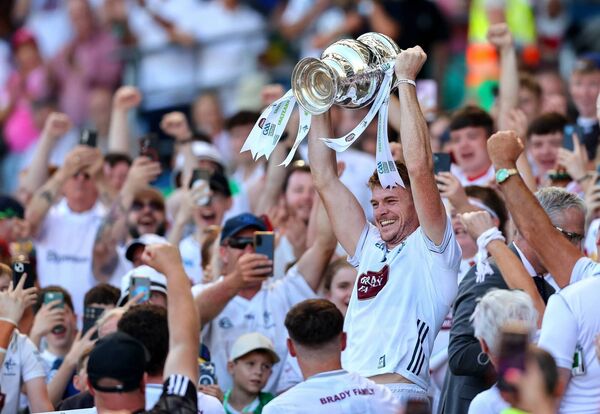
What were your thoughts going into the League? Were there particular goals or stand out games that you were targeting?
We absolutely targeted a good start. When you're a new management and playing under new rules with a new squad and all that, you felt that in order to really get the buy in, we needed to deliver a couple of results early on and we were lucky enough to do that. The League for us was twofold. We absolutely knew we had to get promoted, wanted to get promoted and we weren't shy about saying that within the group. Promotion was an absolute goal for this team. We felt Division 2 and year two was going to be vital as it gave a far greater chance of playing Sam Maguire football so that was nailed on from the word go. The second part, and arguably the more important part, was that we would still be brave enough to develop a squad to give a lot of new lads their opportunity in games and in tough games, away to Sligo, away to Clare. For all these away days that we were having we would trust the panel depth, trust that the players would come through and that we'd be able to achieve both and we did. We got promoted and we felt that, based on the number of players we used throughout the League, the number of debutants that got to cut their teeth at senior Intercounty level, that we were in a great position by the end of the League and kicking into next year.
The loss against Clare and the two losses against Offaly does that dent your confidence or does it become the catalyst to go on and do better again?
I think it's necessary to be honest. You're never going to go in and everything was going to be playing sailing for the first year or a couple of years. I always expected a loss to arrive at some stage and then it was just a case of how well and how quickly we could respond to that loss. I don't think we necessarily dealt with that very well this year. It took us a couple of weeks to come out of that bit of a lull. Our form definitely took a dip in the middle of the season but we did come out of it. That to me, was testament to the group and testament to the character of the group and the ambition of the group because a couple of weeks after losing the Clare and Offaly we produced maybe our best half of football in the second half against Westmeath. We brought that form into the early stages against Louth where we would feel we went toe to toe with Louth in every aspect of the game, but maybe their game management and their experience and their composure in the final few minutes was enough to see them over the line. It was obviously very, very disappointing on the day but I'm okay with that in year one in that this team is learning, this team is developing, but the challenge for us going into next year is that if we land in those moments again, we make better decisions and we can see out games like that.
I know it's your first year, I know it's still a developing phase and all of that but was the loss to Louth a big disappointment for all of you?
It was because we had genuine ambition in Leinster, Pat, and I don't say that now in hindsight. We genuinely went into that Leinster campaign aiming to get to the final and aiming to win the final. Losing to Louth in that moment was a real blow to us. I think we felt it for a couple of weeks but what I would say is, and again, this is maybe testament to the group, but we allowed a period of mourning for two to three weeks. We knew at that stage we were in the Tailteann Cup and that was going to be a real disappointment and a blow in the short term. We came out of it and we allowed ourselves that two to three weeks to lick our wounds a small bit and wait for that Leinster Final to be played out. Then our own draw for the Tailteann came out and we knew what we'd be facing. Again, we felt for one or two games we'd be OK here and we'd be able to manage through it. As soon as that second match against Tipperary was over, we met on the Monday night in the Keadeen Hotel. We sat down and we had a very clear four step process to winning Tailteann and what it was going to take, what it was going to involve and who we were likely to be facing in each of those games. We went off and we drew a line that night and we said, no more looking back, no more talking about what might have been, what could have been and all the rest. We can talk about Leinster again next year but for the next eight weeks we were completely and utterly focused on winning that Tailteann Cup.
Talking to a number of the players pre the final there seemed to be great buy in to that target of not only appearing in the final but winning it?
As a group we refused to accept anything else bar winning the next four games. We said we have no more excuses now; we have everything we need to go on and win this. The players laid out very clearly what they felt the Tailteann Cup would bring to this group. They broke it down to eight or nine simple points around the winning mentality, back-to-back wins in Croke Park, the team culture. That was going to propel us into next year and give us the confidence and momentum that we could be a proper Division 2 and Sam Maguire team. That became the real burning ambition inside each of them every time they took to the field from then, no more looking back and I have to say it was a very, very enjoyable six or eight weeks after that actually.
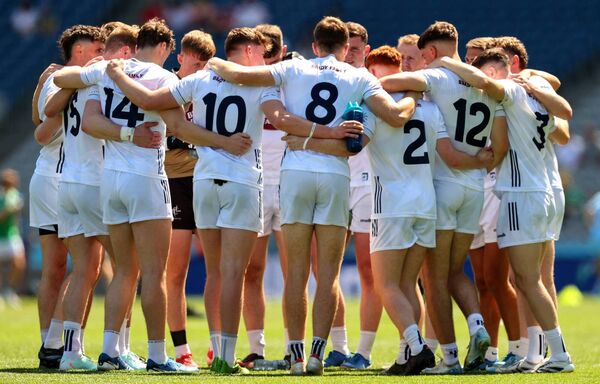
The support may not be back to where it was under the late Micko or indeed under Kieran McGeeney when you were playing but you have more or less made Cedral St Conleth’s a fortress again, that must be important to you and the players?
That is a hugely important part of what we set out at the start of the year. We were going back into the new Cedral’s St Conleth’s Park so there was an excitement around that. The players set their stall out early doors that they wanted to win every home game. No matter who came to Conleth’s, we wanted to win it. They've managed to do that. That sets us up brilliantly going into next year. In terms of the fans there was maybe a disconnection in the last few years with not having a home venue. That’s not anybody's fault as there was a necessity in order to get Conleth’s rebuilt and reopened. Having that back allowed the fans to come into Newbridge on a Saturday evening. Having the games under lights was more social, enjoyable, relaxed atmosphere and the players loved that and really, really enjoyed it. The fans being able to come onto the field afterwards and slap them on the back or shake hands, get a few autographs, get the kids out on the pitch has just brought an energy about the place that I think our group really fed off. That's something important to us and it's something that we want to keep going into next year. If the Kildare senior football team can mirror or go close to what Meath did you this year you will see the numbers return. We will have some cracking games next year with Tyrone, Derry, Meath, Louth, Offaly, all that. Those are really exciting games for everyone to come and watch so I would like to think we can build on what we've achieved in year one and see those numbers grow and grow.
Finally, Brian, all of the players and management team are wearing this white wristband now, with St Brigid’s Cross and 2028 on them, what's the significance of that?
I think it's symbolic for us as a county, not just us as a management or group of players. In 2028 it will be 100 years since Kildare last won the All-Ireland and we want to have this group and this team in as good a position as possible to put our best performances on in 2028 and that's just something that maybe focuses the mind, focuses the thought process. It gives us a very narrow timeline to work towards in the next few years as well. Year one is now behind us and we know what we've achieved and as I said it's a platform. Year two we have a big step up coming ahead in Division 2 and Sam Maguire so let's see where we are at in twelve months, Pat and we’ll keep building towards that.
